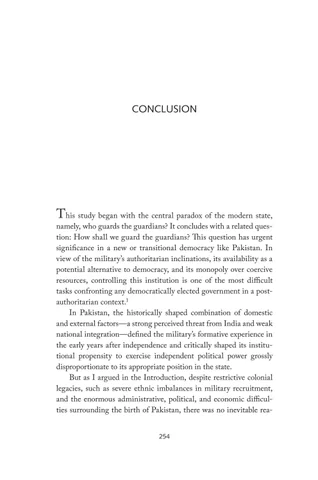CONCLUSION
This study began with the central paradox of the modern state, namely, who guards the guardians? It concludes with a related question: How shall we guard the guardians? This question has urgent significance in a new or transitional democracy like Pakistan. In view of the military’s authoritarian inclinations, its availability as a potential alternative to democracy, and its monopoly over coercive resources, controlling this institution is one of the most difficult tasks confronting any democratically elected government in a postauthoritarian context.1 In Pakistan, the historically shaped combination of domestic and external factors—a strong perceived threat from India and weak national integration—defined the military’s formative experience in the early years after independence and critically shaped its institutional propensity to exercise independent political power grossly disproportionate to its appropriate position in the state. But as I argued in the Introduction, despite restrictive colonial legacies, such as severe ethnic imbalances in military recruitment, and the enormous administrative, political, and economic difficulties surrounding the birth of Pakistan, there was no inevitable rea254

